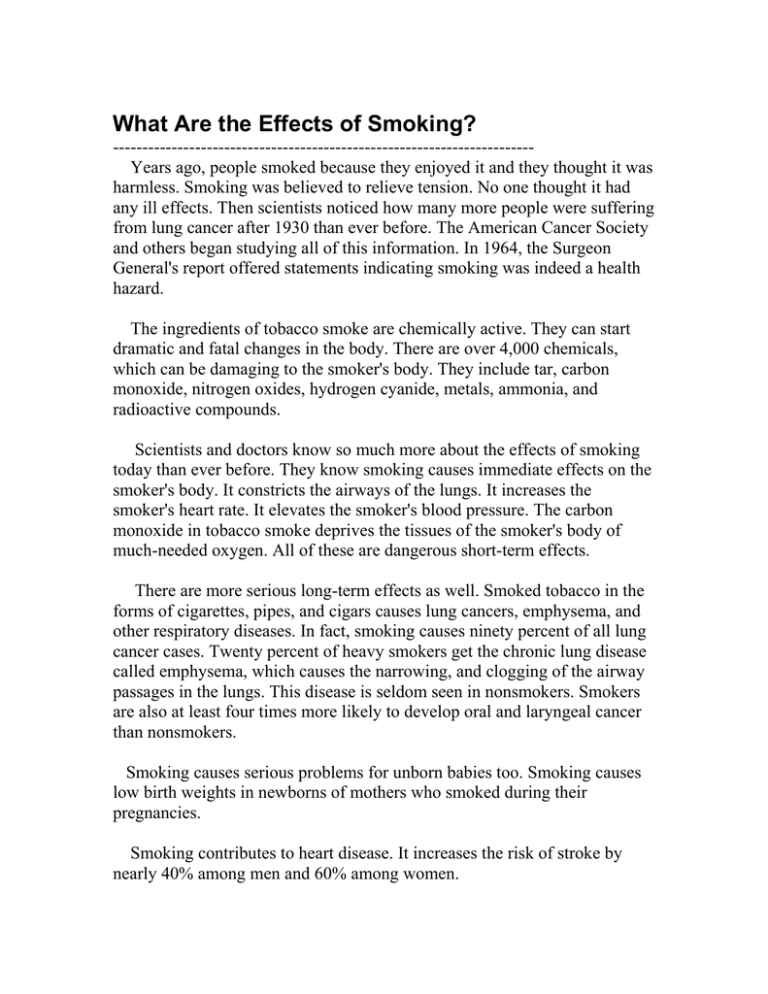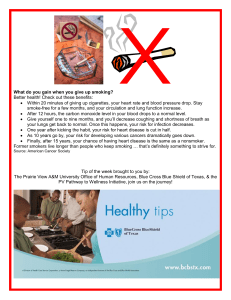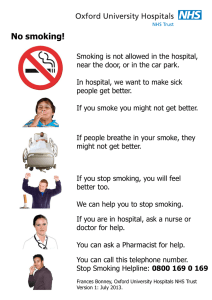What Are the Effects of Smoking?
advertisement

What Are the Effects of Smoking? -----------------------------------------------------------------------Years ago, people smoked because they enjoyed it and they thought it was harmless. Smoking was believed to relieve tension. No one thought it had any ill effects. Then scientists noticed how many more people were suffering from lung cancer after 1930 than ever before. The American Cancer Society and others began studying all of this information. In 1964, the Surgeon General's report offered statements indicating smoking was indeed a health hazard. The ingredients of tobacco smoke are chemically active. They can start dramatic and fatal changes in the body. There are over 4,000 chemicals, which can be damaging to the smoker's body. They include tar, carbon monoxide, nitrogen oxides, hydrogen cyanide, metals, ammonia, and radioactive compounds. Scientists and doctors know so much more about the effects of smoking today than ever before. They know smoking causes immediate effects on the smoker's body. It constricts the airways of the lungs. It increases the smoker's heart rate. It elevates the smoker's blood pressure. The carbon monoxide in tobacco smoke deprives the tissues of the smoker's body of much-needed oxygen. All of these are dangerous short-term effects. There are more serious long-term effects as well. Smoked tobacco in the forms of cigarettes, pipes, and cigars causes lung cancers, emphysema, and other respiratory diseases. In fact, smoking causes ninety percent of all lung cancer cases. Twenty percent of heavy smokers get the chronic lung disease called emphysema, which causes the narrowing, and clogging of the airway passages in the lungs. This disease is seldom seen in nonsmokers. Smokers are also at least four times more likely to develop oral and laryngeal cancer than nonsmokers. Smoking causes serious problems for unborn babies too. Smoking causes low birth weights in newborns of mothers who smoked during their pregnancies. Smoking contributes to heart disease. It increases the risk of stroke by nearly 40% among men and 60% among women. Smoking irritates the trachea. It causes the smoker to become breathless. Lungs of a smoker also have difficulty clearing out poisonous substances because of the hydrogen cyanide in tobacco smoke. There are other effects too. Smokers are more prone to infection. The bone density in smokers is reduced. Smoking can cause inflammation of the stomach and it increases the chance of bleeding ulcers. It causes gum disease. It prematurely causes wrinkling of the smoker's skin. Antismoking efforts try to educate people about all these dangers. Ninety percent of adults who smoke started before they were twenty-one. Many of them started because they thought it was cool or because of peer pressure. Yet today we know that four hundred forty-two thousand people in the United States die each year from illnesses caused by cigarette smoking. Looking at these statistics it is easy to see why the American Cancer Society says smoking is the most preventable cause of death today!






